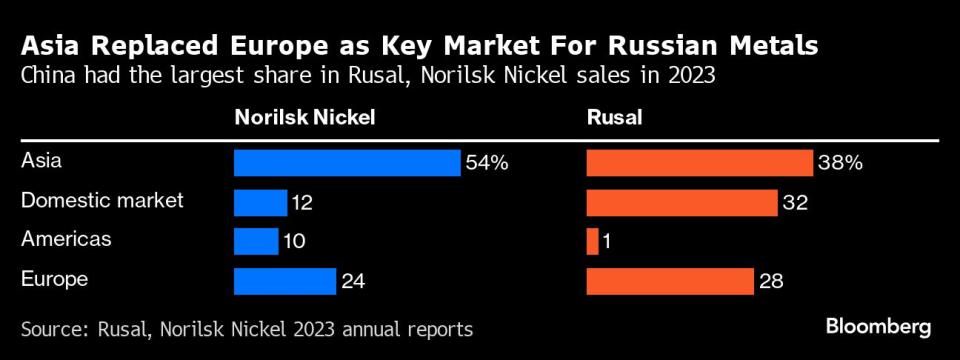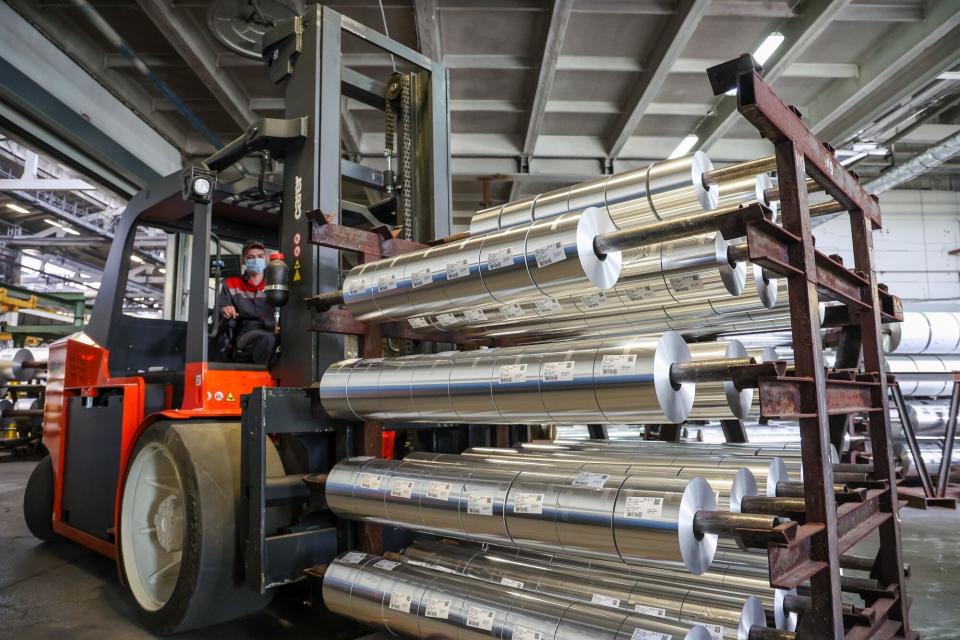Glencore Keeps Russian Aluminum Contract But Metal Flows Dry Up
(Bloomberg) -- Glencore Plc is keeping its contract with Russian aluminum giant United Co. Rusal International PJSC for at least another year, even as sales volumes dwindle.
Most Read from Bloomberg
Citi Trader Got 711 Warning Messages Before Sparking Flash Crash
One Dead After Singapore Air Flight Hit By Severe Turbulence
The deal — starting in 2020 for the delivery of more than 1 million tons of aluminum a year — has been rolled over into 2025 and early 2026, according to people familiar with situation. However, since at least the second half of 2023, Rusal has been shipping only a fraction of that amount, the people said, asking not to be identified as the information is not public.
Glencore agreed to keep the volume-based contract, despite last month’s sanctions that bar new deliveries of Russian aluminum, copper and nickel onto the London Metal Exchange and Chicago Mercantile Exchange. The extension will cover some contracted volumes that Rusal didn’t previously deliver to the Switzerland-based trader, the people said.
Glencore and the press service of Rusal declined to comment.
The Rusal-Glencore deal showcases how international metals trading has changed since Russia invaded Ukraine. The contract was originally a key trading deal for Rusal, but the war has diminished its significance as the company pivoted toward the Chinese market.
Neither Rusal nor Russia’s other metals giant, MMC Norilsk Nickel PJSC, have been sanctioned by either the US or the European Union, but their operations have been impacted by wider restrictions on Moscow. Most European and all US banks stopped funding Russian metals’ deals, while some clients decided it was too uncomfortable to continue trading with the country.
As a consequence, China displaced Europe last year as the biggest market for both companies.
Many deals in the physical metals industry include a stipulation that the metal should be deliverable on the LME. Still, even after the LME barred new deliveries of Russian metal, neither Rusal nor Nornickel have received any force majeure notices from customers, the people said.
Still, the companies’ growing dependence on China presents a dilemma for both Rusal and Nornickel. As the new contract season gets under way, some of their remaining European clients may be deterred by the LME ban, with China the obvious replacement market.
Last month, Nornickel announced a plan to move copper processing to China to minimize difficulties with banking transactions and be closer to the end user. However, it’s also weighing expansion elsewhere — including India and Latin America — as it seeks alternative markets, a person familiar with situation said.
The miner’s Harjavalta nickel plant in Finland is exempt from the LME ban, even though processes Russian metal.
The press service of Nornickel declined to comment.
Rusal expanded domestic sales to nearly $4 billion last year, making it the second-biggest market after China.
The producer proposed that Russia could purchase the equivalent of as much as half of its 2023 exports for state reserves, in the wake of the latest restrictions on the LME, Vedomosti newspaper reported, adding that no decision has been taken.
--With assistance from Jack Farchy.
Most Read from Bloomberg Businessweek
A Hidden Variable in the Presidential Race: Fears of ‘Trump Forever’
Millennium Covets Citadel-Size Commodities Gains, Just Not the Risk
©2024 Bloomberg L.P.

 Yahoo Finance
Yahoo Finance 

